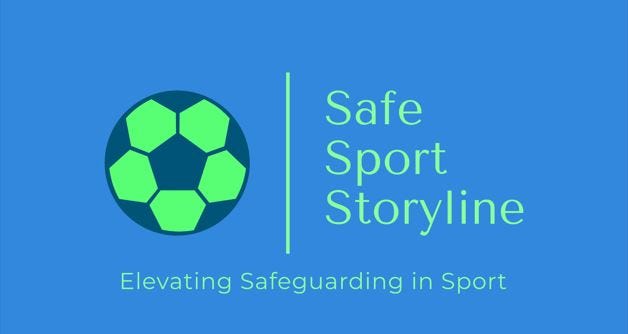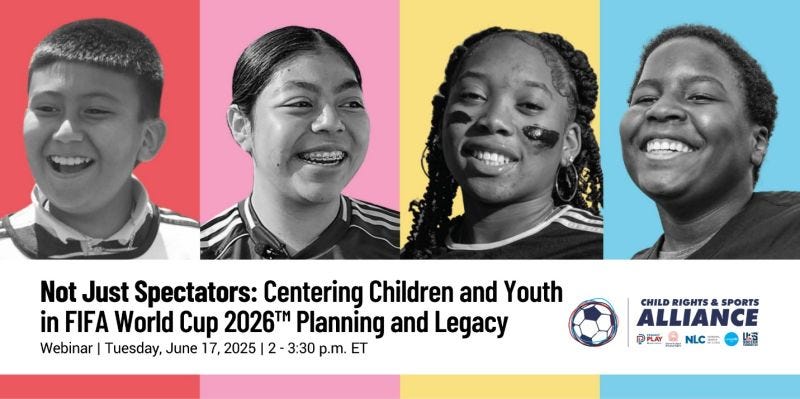Safe Sport Storyline #21
Dr. Yetsa Tuakli-Wosornu, Safe Sport Champion, Ethical Football Agent Practice, IOC Olympism365 Safeguarding News plus Events, Resources and News
Africa’s Safe Sport Champions
Every month, we spotlight a Safe Sport Champion in Africa who advocates for safe sport. This month's champion is Dr. Yetsa Tuakli-Wosornu, who led a panel of 15 experts to create the International Olympic Committee's 2024 statement on harassment and abuse in sports.
Yetsa Adebodunde Tuakli-Wosornu, raised in Boston by Ghanaian and Nigerian parents, represented Ghana in the long jump at the 2011 African Games. She pursued athletics during high school and at Yale University, where she studied African Studies.
Yetsa went on to study Public Health at John Hopkins University and Medicine at the Harvard Medical School. Now Dr Tuakli-Wosornu MD. she practiced medicine as a physiatrist, a medical doctor specialising in physical medicine and rehabilitation. Her specialism and passion for sport lead to her becoming a member of the International Paralympic Committee (IPC) Medical Committee representing Ghana and the IPC’s inaugural Safeguarding Officer.
Yetsa established the Sports Equity Lab in Palo Alto, California, in 2017, introducing an innovative approach to performance science. “By focusing on the human experience, we enhance performance and significantly broaden the population that can participate in sports. Through research, education, community action, and product development, we are creating an environment where all athletes can perform without limitations, and the unique joy and significance of sport are appreciated universally.”
Last year, Yetsa became an Associate Professor at Stanford University School of Medicine and now leads the Stanford Center for Sports Equity. Her research on sports and social justice has resulted in numerous papers in peer-reviewed journals, including the 2024 IOC consensus statement on interpersonal violence and safeguarding in sport, co-authored with fifteen others.
Dr. Yetsa Tuakli-Wosornu serves on the African Union Sports Council’s Safeguarding in Sport Working Group, the Safe Sport International Advisory Council, and the IOC Safe Sport Working Group.
What does good, ethical agent practice look like when working with minors in football?
By Serhat Yilmaz, Senior Lecturer in Sports Law, Loughborough University
Recently, I had the opportunity to lead a session at FIFA HQ in Zurich with participants of the FIFA Executive Programme in Football Agency, exploring this very question.
My ongoing academic work on the development of good, ethical agent practice focuses on both the conceptual foundations and the practical application of what “good” should mean in real world settings when working with minors.
At the heart of this work is a core conceptual construct, based on three key principles: good, ethical agent practice must be child-centred, rights-based, and compliant.
What do these principles mean in practice?
Child-centred
Agents must recognise that minor players are, first and foremost, children. Hence, child must be at the centre of agent practice. This means:
Providing appropriate, age-sensitive support.
Making career decisions guided by the best interests of the child.
Collaborating with the player’s wider support network, particularly with parents.
Rights-Based
Agents should respect and promote children’s rights as set out in the UN Convention on the Rights of the Child (UNCRC). This includes:
Acting in the best interests of the child.
Involving minors in decision-making, fostering their voice and participation.
Supporting their holistic development alongside football development.
Proactively safeguarding them from harm enhancing their protection.
Compliant
Agents must understand and follow all applicable laws and football regulations when working with minors. This means:
Understanding and staying informed about relevant legal and regulatory frameworks.
Ensuring full compliance in every aspect of their practice.
Developing truly ethical practice begins with understanding what it should look like, both conceptually and operationally. I am looking forward to contributing to this evolving conversation with organisations and practitioners committed to doing better for young players in the world of sport.
IOC Olympism 365 Summit: Safer Sport and Safer Communities Through Sport
On the second morning of the IOC’s Olympism 365 Summit: Sport for a Safer World, safeguarding in sport was the main focus. The first plenary session discussed enhancing collective action through the Safe Sport Regional Hub Initiative and strengthening community-driven strategies for safeguarding and psychosocial support in sports.
HRH Prince Feisal Al Hussein, IOC Member and Chair of the International Safe Sport Steering Committee, urged governments to prioritize safeguarding and mental health policies, and sports organizations to focus on athlete well-being over medals.
During the plenary session, Africa was notably represented by Dr. Joan Nyanyuki, Chair of the African Partnership to End Violence against Children and Executive Director of the African Child Policy Forum, alongside Kady Kanouté Tounkara OLY, Member of the International Safe Sport Steering Committee.
The summit pledged to enhance safer, healthier, and more sustainable sports by addressing violence, promoting mental health, and building community-responsive systems through local action and global partnerships.
Commitments made during the Summit included:
The IOC and United Nations Spotlight Initiative announcing a joint effort to strengthen the contribution of sport to ending violence against women and girls.
The IOC and FIFA agreeing to collaborate to enhance the impact, effectiveness and scalability of sport-based health initiatives, including those related to athlete physical health, mental health and well-being and safeguarding.
Introducing new technical tools to improve early recognition, coordinated care and overall capacity, delivering safety in and through sport.
You can listen to the plenary sessions at summit on YouTube.
EVENTS
Not Just Spectators: Centering Children and Youth in FIFA World Cup 2026™ Planning and Legacy
June 17, 2025 08:00 PM SAST
The FIFA World Cup 2026™ is more than a tournament—it is a chance to uplift children and young people in every community across the U.S., whether or not your city is hosting matches. Join us for a discussion on ways to explore how cities and organizations can create lasting impact by meaningfully engaging children and youth in the lead-up to, during, and beyond the World Cup. This online seminar will spotlight practical strategies and real-world examples to help ensure young people are not only included—but empowered—as part of your city’s legacy.
Register for this webinar here
RESOURCES
Establishing and Maintaining Healthy Boundaries with Athletes: A Practical Guide for Coaches
Establishing and Maintaining Healthy Boundaries with Athletes: A Practical Guide for Coaches is a free resource to download.
This document provides information aimed at: 1) Defining boundaries involved in the coach-athlete relationship, 2) Establishing guidelines for setting and maintaining healthy boundaries, 3) Clarifying misconceptions and navigating grey zones, and 4) Outlining unacceptable behaviours and actions to take when boundaries are crossed.
This resource can be found here
Child Safeguarding Is a Leadership Responsibility—Not Just a Policy: What Every Leader Must Know and Do About Child Safeguarding
Some thoughts for leaders in sport to reflect on. Lemuel Bonete, Senior Technical Officer & Global Lead-Child Safeguarding at Children International writes on Child Safeguarding being a Leadership Responsibility.
Child safeguarding is often viewed as a compliance matter—a set of protocols, checklists, and reports. But the truth is, safeguarding is leadership in action. It's about creating environments where children are not only protected but respected and empowered. And that starts with us.
We often say that safeguarding is everyone’s responsibility. While that’s true, leaders set the tone. We shape the culture. Our actions—or inaction—send powerful signals about what is tolerated, what is prioritized, and what is ignored.
Read more here
Public Health vs. Integrity: Finding the Balance in Safeguarding in and through Sport
In the evolving landscape of sport, safeguarding against violence, harassment, and abuse is more than a checkbox—it’s a cornerstone of trust. If we are to explore issues of governance and compliance with international safe sport frameworks, codes, or regulations, a fundamental question concerns the approach taken: is safeguarding in and through sport primarily a public health issue or an integrity concern?
In this article, Safe Sport International’s Chief Operating Officer, Neal Anderson, explores why the answer might be both and how embracing a dual perspective can ensure sport remains a safe and positive force for all.
Read this article here
Safeguarding in Out of School Settings including Sports Training
The UK’s Department of Education has recently published updated guidance on safeguarding in out of school settings including sports training.
Also available on their website is free e-learning e-learning that works on all devices and leaflets and posters you can download. Although these resources are for use in the UK, safeguarding practitioners in Africa will find them a useful resource.
The resources can be accessed for free here
Trauma- and Violence-Informed Physical Activity Training
The Trauma- and Violence-Informed Physical Activity (TVIPA) have been developed for the Canadian context but may be of interest to practitioners in Africa seeking a free, self-paced, online resource designed to support anyone facilitating movement in community, recreation, health, or care settings.
These training modules are grounded in evidence and guided by the lived experience of those delivering and participating in TVIPA programs.
💡 What you’ll find:
🔹 Lesson 1 – The Warm Up: Introduction
🔹 Lesson 2 – The Starting Line: Gender-based Violence &TVIPA
🔹 Lesson 3 – Raising the Bar: Introduction to Trauma
🔹 Lesson 4 – The Game Plan: Trauma- & Violence-informed Service Provision
🔹 Lesson 5 - TVIPA in Motion: Examples of Low-barrier Physical Activity
🔹 Lesson 6 - The Cool Down: Trauma- and Violence-informed Resources
The training modules are available in English and French.
Whether you’re new to this work or your own practice is well underway, the Health and Wellness Equity Research Group hope these modules offer something useful – if you have time to work through them, they invite any you to reach out with any questions, reflections, or feedback!
🔗 Explore the training here
Robust Safeguarding Cultures Reflection Toolkit
Is your organisation building a robust safeguarding culture?
Download ECP’s FREE Robust Safeguarding Cultures Toolkit – designed to support organisations in evaluating and strengthening their safeguarding systems, behaviours and culture. This toolkit offers clear guidance to reflect on current practice and lead improvement.
An essential resource for DSLs, senior leaders and safeguarding lead
Access this resource here
Be an empowering and supportive coach: Health Promoting Sports Coach implementation guide
Sports coaches play a key role in participants’ sports experiences and can positively influence their social, mental, and physical health. Nevertheless, sports coaches are often volunteers and may benefit from knowledge and support regarding the fostering of their sports participants’ health and well-being, beyond the technical and tactical aspects of sport.
The Health Promoting Sports Coach implementation guide provides practical advice to coaches on how to integrate health promotion into their coaching. The first section of this guide covers the theoretical background, including definitions of health promotion and a Health Promoting Sports Coach, the role of coaches in promoting health, and the stages of progression in Health Promoting Sports Coach practices. The second section provides a practical checklist of concrete actions for coaches to undertake before, during, and after training, to promote health in their coaching. The third section presents long-term strategies to implement health promotion within coaching, based on the Health Promoting Sports Club model.
This practical guide will help coaches to approach and implement health promotion comprehensively, through their actions, relationships with sports participants and other stakeholders, and role modeling, and within the overall club setting.
Download the resource here
NEWS
Breaking News from the Olympism365 Summit
IOC and partners announce new tools and programmes to strengthen safety and well-being in and through sport
"Convening stakeholders from across the globe, the Olympism365 Summit has facilitated the development of concrete, impactful programmes and tools that will measurably improve safety in and through sport,” said Kirsty Burrows, IOC Associate Director for Health, Medicine and Science.
In this news item the IOC announced a number of new safe sport initiatives.
You can read details here
South Africa bowler storms at Bangladesh batter
An "unacceptable" and "extreme" situation unfolded in Dhaka last Wednesday when South Africa bowler Tshepo Ntuli and Bangladesh batter Ripon Mondol got into a scuffle during the four-day red-ball match between Bangladesh Emerging Team and South Africa Emerging Team.
Read more here
Safeguarding at FIFA Beach Soccer World Cup 2025 in the Seychelles
Safeguarding at FIFA Beach Soccer World Cup 2025 was lead by Kerin Moses a graduate of the FIFA Guardians Safeguarding in Football Diploma who has been the Seychelles Football Federation’s designated safeguarding officers for the last two years. for more than two years.
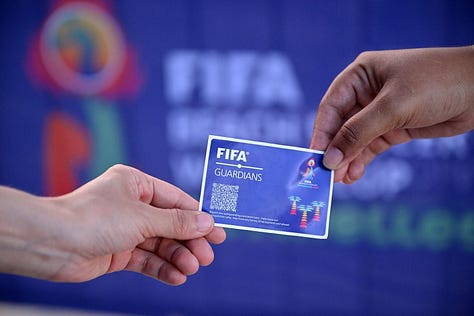
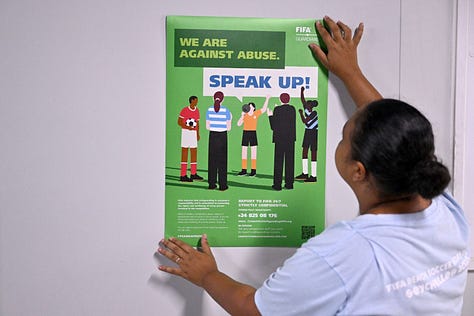
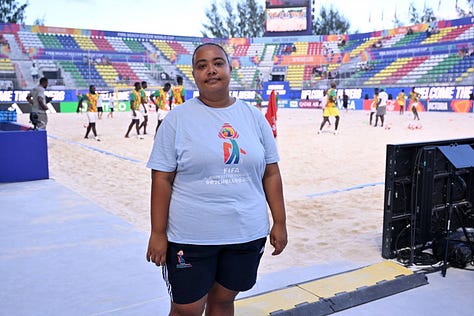
Sport for Gender Based Violence Prevention
The GIZ Sport 4 Development in Africa (S4DA) team, in collaboration with the Access to Justice Project, successfully conducted a powerful Sport for Development (S4D) & Gender-Based Violence (GBV) prevention training in Bahi, Dodoma, Tanzania.
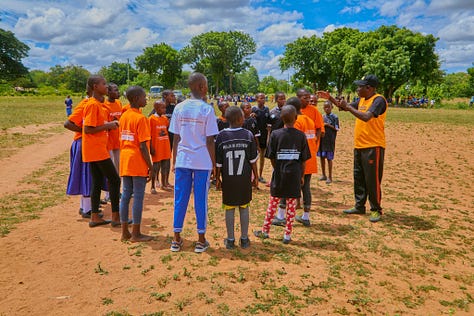
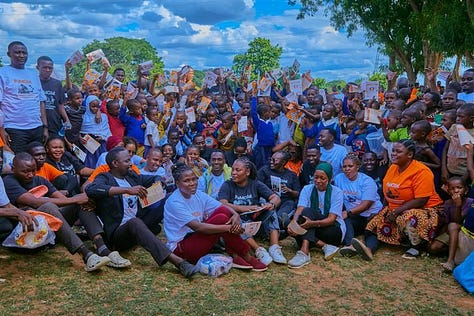

The 3-day workshop brought together a dynamic mix of Paralegals, Government Officers, Community Coaches, Teachers & Academia Representatives. Attendees explored how sport can serve as a tool for empowerment, inclusion, and violence prevention. The training culminated in a community sports event that energized local youth and raised powerful awareness messages on GBV prevention, safety, and gender equity.
Tucheze Pia Teacher's Training Kenya
In May, Alive and Kicking's Tucheze Pia launched its first Teacher Training Workshop in Nairobi. The 3-day session equipped teachers from Kenya with skills to support over 4,000 visually impaired children through sport. It also covered safeguarding in sport and mental health training.
What parents and youth athletes can do to protect against abuse in sport
Parents and caregivers have the right to be included in their children’s’ sporting participation. This involves being informed about training times and competition schedules, training content, coaching style and behavioural expectations. Parents should also be welcomed to watch their children’s training sessions at any time and unannounced.
Read the full article here





